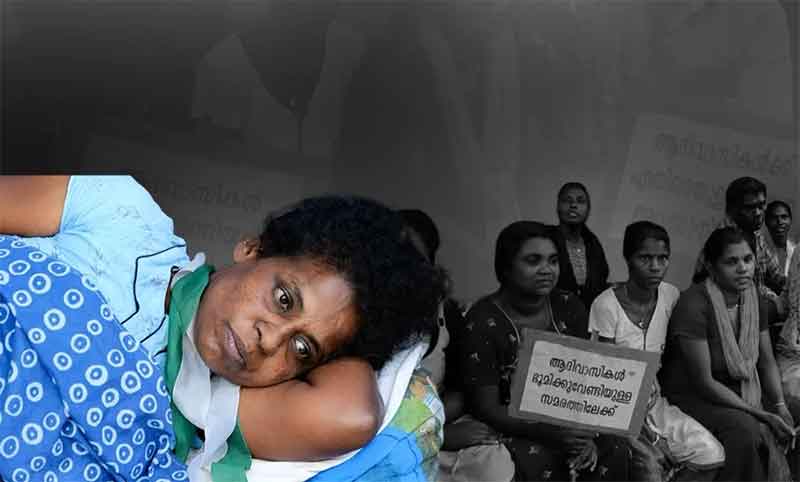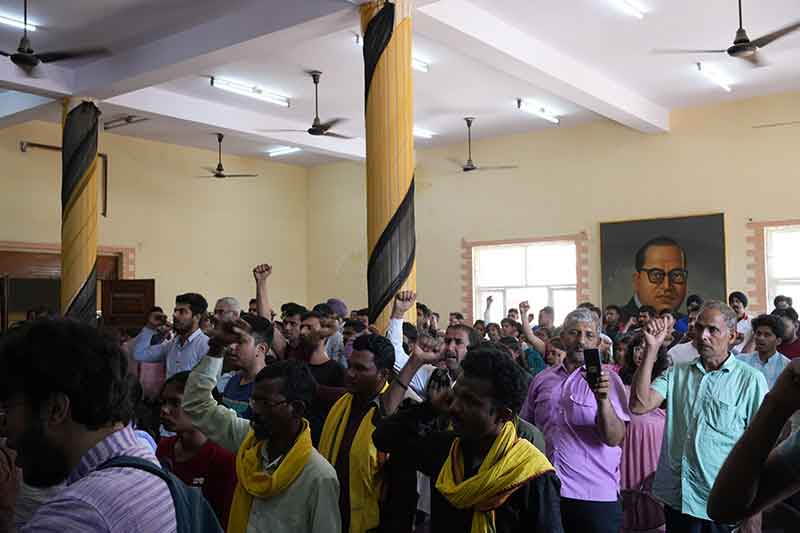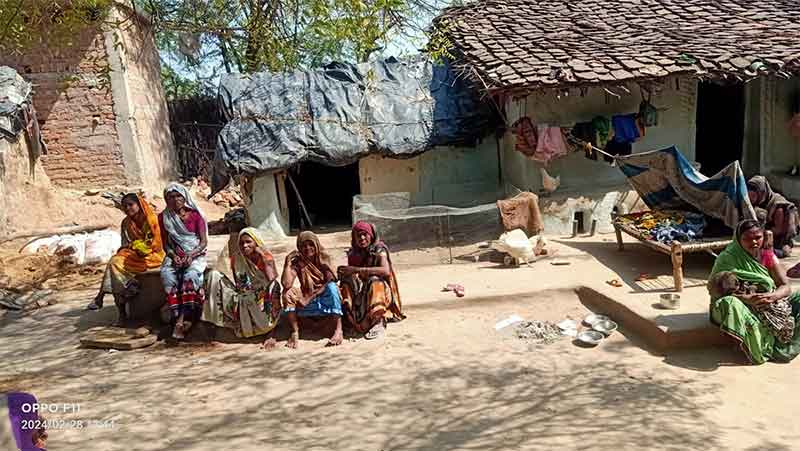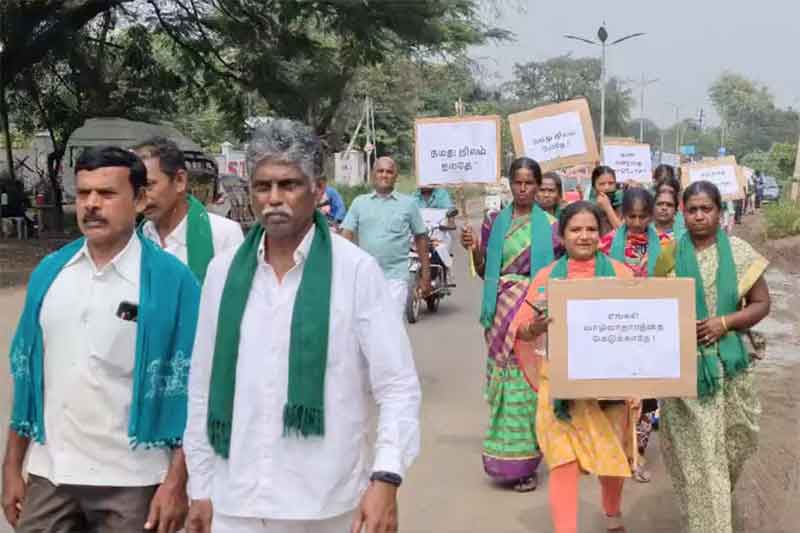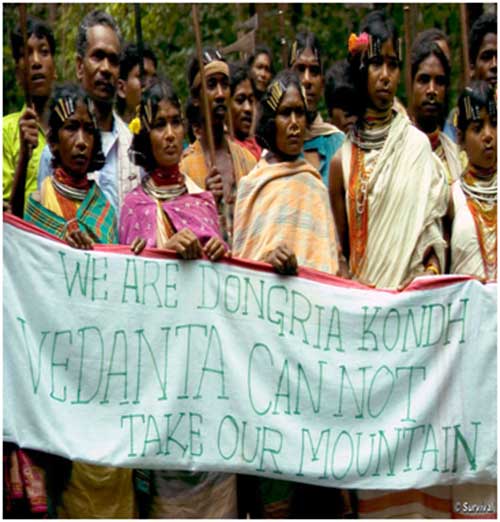High Court places restraints Instead Of Protecting People’s Rights

Around 2000 rural poor, mostly adivasis, came from across Telangana to join a protest at the dharna chowk, Hyderabad on April 28, 2022. The Grameena Pedala Sangham had to conduct its demonstration, with about 200 people, as per conditions laid down by the government and the High Court. It was focusing on the land question of tribal poor pesantry. Women participated in good numbers, but many were confined to a venue over 30 kms away, where a meeting was held later in the evening. (photo shows a section of the participants.)
Grameena Pedala Sangham waged many struggles of the rural poor across the Telugu states, Telangana and Andhra Pradesh, during the last four decades, with ‘Abolition of landlordism and land to the tiller’ as its chief slogan. Led by it, landless and poor pesants, adivasis included, had occupied around 30,000 acres and are cultivating it. GPS had to overcome many hurdles created by the Govt and the High Court, which gave a belated order on 27th evening that only 200 people be allowed to join the dharna, while thousands were expected, and already on the way.
This Report has two aspects that are of general interest: Firstly, how democracy is curbed and denied to the people, even top courts playing second fiddle to the authorities; and secondly on how adivasis are harassed by Governments, despite tall claims of so many welfare measures for them.
*** ***
Grameena Pedala Sangham, GPS (Organisation of the Rural Poor) of Telangana State decided to conduct a Dharna and public meeting on 28-04-2022 in the dharna chowk, near Indira Park in Hyderabad. Accordingly, it had conducted an intensive preparatory campaign in tribal tracts across Telangana, where adivasis were feeling agitated by perpetual suppression by the authorities, and applied for permission, as required by rules, to hold a dharna with 1000 rural poor people.
The dharna (protest) was meant to demand the government to stop all repressive actions against the tribal and non-tribal poor, shift/ Podu-cultivators, and to issue Pattas (title-deeds) for the Podu-lands to those poor who have been cultivating the same for decades. They have submitted an application to the police authorities concerned well in advance, i.e, on April 13 itself seeking permission for the same.
Podu lands are those in forest and hill areas, traditionally cultivated by landless adivasi poor whose lands were alienated. It is also called as shift or jhum cultivation. Thanks to plunder by vested interests, at many places forests are only on paper, but poor adivasis are denied their rights.
Right to protest and the dharna chowk
There hangs a story worth knowing about the dharna chowk itself, which exposes the state of Fundamental Rights enshrined in the Indian Constitution (Article 19-1-a,b,c). People in undivided AP, as elsewhere in India, originally used to conduct agitations near the state Secretariats, or the Assembly, and represent to the authorities. But prohibitory orders around them were issued and renewed for decades by the undivided AP state government, to stop people from reaching the seat of administration. Instead, it designated, around 20 years ago, Indira Park, almost two kilometres away, as the place for agitations. But even for that, people have to seek permission, and police decide on it.
*** ***
Democracy and law, of the Nizam era, and later
Thus it is the police who control Fundamental Rights in India, in Telangana too. Hence came the epithet of Police raj, that became popular during Congress rule, more so since the days of Indira Gandhi and her emergency rule (1975-77), which however was emulated by all non-Congress parties when they were in power.
That restriction was resented by people, more so in the days of movement for separate Telangana. It was likened to the notorious Gashti Nishan tirpan (Circular Number 53) of the erstwhile Nizam government, that virtually banned, in the name of regulating public order, any public protests. New state of Telangana, formed in 2014, would have no place for such draconian restrictions imposed by united Andhra Pradesh authorities, it was promised, also by TRS that was formed 20 years ago.
However, the new govt of TRS led by K.Chandra Sekhar Rao (KCR) itself banned in March 2017, any protests near the dharna chowk, ostensibly in the interest of peace and public order. It suggested places, as far away as 10 kilometres, as a substitute, signifying its own distancing from the people. That was greatly resented by people in Telangana, and compared with the Nizam’s rule. The High Court in September 2018, dealing with a PIL, issued interim orders restoring the dharna chowk.
However, soon after, Covid was used by the TRS govt to ban any protests and public activity, more so by Opposition political forces. As Covid abated, restrictions were removed in recent months. Thus the GPS applied for police permission which was denied at the last moment.
The TRS, right now celebrating its 21st Foundation Day, and its government in Telangana state are claiming to be the best and most pro-people, pro-farmers, and a democratic government. However, notwithstanding its claims of so many reforms, the real anti-people and autocratic character of TRS Govt is being exposed by its callousness and repressive actions against the people, particularly the rural poor, every day.
It was once again exposed by denying permission for this peaceful dharna sought to be conducted by the rural poor, adivasis in particular. The police authorities, after sleeping over the application for permission for many days, issued orders rejecting the permission, without any valid and justifiable reasons. The reasons mentioned by them are only general and imaginary in nature such as traffic problems and possibilities of some miscreants creating law and order problems etc. This they issued at the eleventh hour. It is to be noted that number of such Dharnas, meetings and other political gatherings even with thousands of people were permitted earlier, before TRS came to power.
Only a few days ago, big crowds of Hindutva brigade were allowed by TRS government, on Srirama Navami and Hanuman Jayanti, to take out massive and long processions with sticks and swords in display.
Incidentally, it may be mentioned that KCR and his TRS party, despite KCR’s rhetoric, backtracked on their anti-BJP stance. He clarified in TRS plenary, on April 27: “ Communist leaders called for a united fight by all parties to dethrone the NDA ..I told them it was a bad idea…It shouldn’t be our business as to who should be made PM or remove some leader.” He was not in favor of forming any political front ahead of 2024 elctions. Instead the country needs an alternative agenda, reported Times of India (Apr 28,2022), the caption saying ‘KCR changes tack, not aiming to topple central Govt.” Only a few weeks ago, he said in a rally: Modi should be “driven out of the country” for his divisive and communal agenda.
*** ***
High Court places restraints
The police order was issued belatedly on the week-end, so that Courts are not approached in time. GPS however immediately filed a Writ Petition (WP.21381 of 2022) before the High Court of Telangana at Hyderabad praying to declare the action of police authorities in not considering the permission sought as illegal, arbitrary and violative of fundamental rights under Articles, 14,16 and 19 of the Constitution. The petition came up for hearing on 26-04-2022, just two days before the event.
It was pleaded before the court that similar permissions are being accorded to others and it is highly unjustified to deny in the case of GPS as it has a very bright record of conducting such massive dharnas and public meetings on several occasions earlier, without any disturbances and law and order problems. The police authorities pleaded that as per intelligence reports they have guidelines not to accord permission for gatherings if more than hundred people are expected, and they sought time for producing the circulars etc. in support of the same. Allowing the same, the court has postponed the hearing to 27-04-2022, that is just one day before the proposed Dharna.
The High Court asked the Govt to explain criteria to allow or disallow any such gatherings. The police authorities did not mention any specific reasons for denying such permission to GPS, the organisation of Rural Poor.
On 27-04-2022, the police authorities filed certain circulars along with nearly 500 pages of intelligence reports and argued that this GPS and certain other mass-organisations are being led by UCCRI-ML and that though these are not banned, they are revolutionary organisations and their ideology is the same (as that of banned organisations) which therefore could not be allowed to conduct agitations with 1000 people. Rebutting the same, it was pleaded on behalf of the GPS that it is a mass organisation of rural poor seeking protection of their rights on land etc. and the present dharna is only in respect of the grievances of Podu-cultivators.
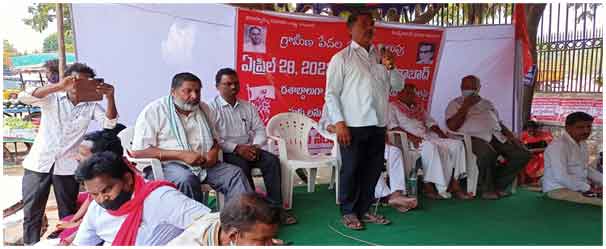
GPS leaders speaking at the Indira Park (Hyderabad), at a dharna for the land rights of the adivasis, around noon time, on April 28,2022. Telangana Government refused permission for the protest meet, produced 500 pages of intelligence reports, and told the High Court they were revolutionaries guided by UCCRI-ML, founded by DV Rao and T.Nagi Reddy. The Court asked if it was a banned organization; NO, replied the Govt. The court then directed the authorities to give permission for dharna, but with only 200 people.
The Court order laying down restrictive conditions could be nothing else but an indirect support and a tacit approval to the government, it was felt, in curbing and suppressing the democratic rights of the people, in particular poor adivasis. But that is how the courts are generally functioning, as part of the state machinery.
Accordingly police permitted the program, on the condition that the organisers should submit an undertaking to conduct dharna with only 200 people, apart from several other conditions like permitting only one box-mike. Anything beyond the undertaking is punishable, it was stated in the Order.
The police authorities, only after receiving such undertaking, granted permission with several more conditions, and that was late on Apr 27th, only a few hours before the rally schedule and announced long ago.
One of the conditions, ironically, is that no hate-speeches should be made! Hate-speeches instigating communal hatred and violence against certain communities are brazenly being allowed with impunity in the country, also by KCR Govt, as observed lately by the Supreme Court itself.
What kind of hate speeches the rural poor seeking just livelihood could make is a question that did not come to the mind of the authorities and even the Court. This is one more case where the courts are just toeing the government line, instead of coming to the rescue of poor people to protect their Constitutional and democratic rights. It has all become a sophisticated system where the ruling parties, bureaucracy, the police and the courts are acting in tandem to suppress the democratic rights of the people, particularly the tribal and non-tribal poor who are fighting for land and livelihood.
GPS as part of its struggle for land and other rights of rural poor has made strenuous and commendable efforts during the last twenty days for mobilising the tribal and non-tribal poor on solidarity to the Podu-cultivators. Adivasis from several districts of Telangana reportedly were already on the way despite Rabi harvesting operations, and braving hot summer, with temperatures in some places touching 43 degrees C. With a belated Court Order, people faced many difficulties.
The government is trying to suppress their freedoms, livelihoods, and seeking to extinguish their enthusiasm using the very constitutional machinery that is supposed to protect their rights.
*** ***
TRS’ promises on ‘farm lands to the landless poor’ belied
It had promised, before 2014 and 2019 Assembly polls, three acres of lands to all landless ST and SC families, but later backtracked on it. TRS leader, Chief Minister KCR had promised that he would personally visit tribal habitations, sit with people, and resolve the podu lands issue within weeks after polls. The landed rich of Telangana are feted by several schemes of the govt, like Rythu Bandhu, by which the landed rich each got lakhs of rupees gratis, while the poor tenant are denied even small support as they have no lands and no recorded rights.
‘Deliver the memorandum at the Security gate’!
In fact, when a GPS delegation, after advance information of several days, went to submit a memorandum to the Chief Secretary, they were advised to give it in the security office at the gate! Earlier, even if the related officer is not available, the Deputy official would receive it, and listen to them. Now the Security is administering the system! Same thing happened at Governor’s office, and the memo was likewise delivered at the gate. This is the reception poor people get, even when they came in thousands to represent their problems.
Demands
The Memorandum addressed to the State govt, after briefly narrating the problems, listed the following demands. A copy was given to the Governor’s office also, as the Forest Rights Act (FRA) 2006 was a central legislation:
- Pattas (Title-deeds) should be issued to all the adivasis and non- adivasis poor pesants for the lands they cultivated for decades.
- All claim applications under FRA that are kept pending should be examined immediately, the relevant lands should be surveyed, and the pattas should be entered into Revenue Records.
- All adivasi pesants must be given relevant farm subsidies, other inputs and resources; all those eligible must be issued pattas.
- All podu lands cultivated by the poor peasants must be considered, and as per rules of the Integrated Survey of the Govt be included in the relevant lists, and be accorded the subsidy under the Rythu Bandhu scheme.
- All lands for which decrees were given in favor of adivasis by Courts and tribunals, under Act 1 of 1970, must be duely recorded and immediately handed over to the girijans.
- Girijans must be permitted to enjoy all cultivable podu lands.
- Offensive steps against girijans like framing up cases, arrests, seizing farm equipment including tractors, and destroying crops on podu lands must be stopped.
*** ***
Every year in the months of May and June, before the monsoon, the authorities crack down on the tribals and collect millions of rupees in bribes.
Penalties are imposed in the courts. These bribes and fines add up to huge sums that are more than what these governments are spending in the name of tribal welfare. The tribal poor who are constantly facing these harassments and atrocities are fed up with all these things.
Hence this protest program in April.
Given below is the slightly edited Text of a Press Release issued by GPS, explaining the issues that led to the protest at Hyderabad, April 28, 2022:
Struggle For Podu Lands Would Not Stop Until The Cultivators’ Rights Are Achieved
Tribal people from all over the Telangana State (TS), led by the Grameena Pedala Sangham (GPS, Organization of the Rural Poor), are marching to the state capital on April 28, 2022, to bring to the attention of the central and state governments the problems they are facing, and demanding rights to the podu lands that they have been cultivating for decades.
Faced with many problems, these tribal poor who are struggling for their livelihood are under attack from all four sides: The landlords, as well as the revenue, forest and police systems are indulging in various repressive methods such as assaults, atrocities, irregularities, imprisonment, dragging them round the courts, illegal land grabbing, threats, destruction of crops and destruction of farmland. There have also been incidents, even in recent times, of adivasis being tied to trees and beaten when they tried to prevent the destruction of crops.
Governments have not heeded the repeated appeals and petitions to the Revenue and Forest Department officials, the ITDA officials and District Collectors. Harassment and violence increased rather than going down. The government have also created several obstacles to the tribals seeking to come to the state capital and represent their problems to the state and central governments.
Tribal Revolts and the Land question
The tribal land issue is not of one of recent times; it has been there for centuries, and led to tribal revolts across the country. Alluri Sita Rama Raju organized the tribals of Manyam area (in the present day state of Andhra Pradesh) against the exploitation and atrocities of the then British rule. Under his leadership the tribal people rose in an armed revolt, and he was killed in 1924.
Later, in the Adilabad district of Telangana, which was then ruled by the Nizam, people of the Gond tribe opposed the plains’ area landlords being accorded pattas (title-deeds) for the podu lands they brought under the plough. Thus under the leadership of Komuram Bhim (killed in 1940), they took to arms and waged a struggle, against their plight of having to work as tenants on the lands they were cultivating for long. These struggles were suppressed by the then British and Nizam governments by deploying armed forces against the tribal poor.
However, recognizing the impact of those ongoing struggles for land, and the dangers involved therein, some amendments were made in the forest and land laws, to give some concessions, if only to douse the struggles temporarily. Several enactments and Schedules were made ever since the British rule ostensibly to protect the tribals and their rights, and to check alienation of their lands, such as The Act of 1917… de-foresting of lakh acres of land etc were contemplated, but the tribal land question and other problems remained un-resolved.
Telangana armed struggle (1946-51) had raised the land question of tribals as well as non-tribal poor, as is well known. In the late 1960s, the Srikakulam adivasis, led by communist revolutionaries, went into armed struggle for land in protest against the exploitation and atrocities being perpetrated on them. About 350 revolutionary activists and adivasi cadres were killed by armed police during 1969-73 period.
The Indian ruling classes, post-1947, sought to suppress these struggles more brutally than the colonial British and the Nizam governments.
*** ***
Tribal laws meant to rescue ruling classes, not the adivasis
Thus came a plethora of tribal laws, like the one in 1957, and the famous Land Transfer Regulations of 1970 (1/70).
On the one hand, the rulers have indulged in worst repression to suppress the people and their struggles; on the other hand, they have been bringing in protective laws in their name so as to divert the tribals every time a struggle breaks out. But they were never implemented in favor of the tribals. Even for the enforcement of those laws, adivasis are forced to wage struggles for decades.
The protective laws were enforced to some extent only when and where the rural poor and the tribals waged relentless struggles in the face of repressive measures.
Reserve forest laws made in the name of regularizing forests have been playing havoc with the tribal livelihoods all the time; the tribal poor had to wage struggles, for decades, to counter being evicted from forest lands. Thus in 2006, the Union Govt enacted another FRA, the Forest Rights (Recognition) Act, and states issued their own regulations. They claimed that the law was favorable to tribals as well as non-tribals in forest areas. But in practice there is little that helped the poor.
However, landlords and bigwigs in agency areas (mis-)used the provisions, to create and manipulate records (eg. that they had been in possession of lands for long) so as to regularize the lands they grabbed over decades. They were able to legalize in their name all the lands they were illegally enjoying, with the help of corrupt officials, using certain provisions (such as showing evidence of cultivation for 30 years). There is also a clause that sets up committees with local public representatives to receive adivasis’ claims/applications through them.
Representatives of the ruling parties used the clause to benefit their own vote banks, accepting applications that would only benefit a few of their followers. Others’ applications were not accepted. A few applications from people were received only to be rejected, or kept unresolved. Decades after this enactment, tribal people still roam around the offices and the courts with no reliefs.
Even where courts issued orders that the land belonged to the poor, either by the 1/70 Act, or by FRA 2006, they are not executed: the court orders require the Revenue authorities to immediately conduct a panchanama, and restore the the land to the tribals. But even after decades of litigation, land is not restored to the the poor. That is because of corrupt officials, and manipulations by ruling politicians who serve the landlords, bigwigs and other land grabbers. Thus the adivasis have no rights over the lands they cultivated for long.
Even where people are in possession and cultivated lands, they are not getting the facilities, like loans, bore-well and power subsidies, loan waivers etc provided by the government and the banks, because they do not possess title-deeds.
As a result, their lands could not be developed, irrigated, for enhanced productivity and higher yields. Thus agriculture is made a losing proposition, and tribal farmers are left in debt and frustration. Agriculture is not made sustainable on lands they cultivated against many odds.
Tribal poor are thus being turned into coolies on their own lands and driven out as migrant labor for their livelihood.
Ensure Environmental Protection by associating the adivasis
On the other hand, advocates for wildlife conservation approached the courts to repeal the 2006 law, claiming that wildlife is being harmed. They demanded the repeal of the law on the one hand and the eviction of 12 lakh people from lands that were found by the respective state governments to be illegally occupied under the Act.
The Supreme Court ruled in February 2019 that about 12 lakh tribals across the country should be evicted from their forests. Most of the victims are tribal poor, and not the big sharks.
As a result, there was a big upheaval in the tribal peasantry. In this context, in the Telangana state election campaign at the end of 2018, TRS leaders, KCR in particular, have repeatedly promised to resolve the tribal land issue within two months after the elections. But then nothing happened as usual.
The central government, which has been sitting idle even as tribal rights are undermined for so long, had intervened in the court case just ahead of the 2019 general elections, saying the Court order will have a deleterious impact on the lives of millions of people, obviously with an eye on the polls.
The Court Order was stayed but the problems of the tribal people were not solved. Thus years after that, the Central and State Governments have not taken any further action in favor of the people. Arrests, evictions and atrocities continue as usual.
Capitalist-imperialist plunder extended even to the forests
Illegal occupations by landlords, forest contractors, and bigwigs continue. The government is indiscriminately taking over tens of thousands of acres of forest land, and allocating them to the wealthy for big industries, holiday resorts, luxurious farm houses etc.
Theft of timber and forest produce is rampant, aided by the involvement of the ruling parties. It is an open secret that lakhs of crores of rupees are changing hands, obviously because of such deforestation. In fact tribal poor are able to escape the attacks by wildlife in the forest, but cannot escape those by the government, landlords, revenue and police systems. Exploitation and repression are on the rise, but not decreasing.
The fact is that the policies of the rulers, which are nothing but to enable profiteering by the ruling classes, have caused serious damage to the forests and environment. There is also a need to address this issue with the right perspective. But what everyone needs to realize is that just as wildlife and forests are part of nature, so are people, especially tribal poor farmers.
The adivasis have the potential to conserve the environment in a way that no one else can if modern facilities are provided to the tribal people, and their legitimate rights are protected, for they are, for centuries, coexisting with nature and wildlife.
Environmental protection should be intended to benefit the people but it is inhumane to achieve it by destroying their livelihood and making their lives even more miserable.
To undermine the interests of the adivasi people would only impair the nature as well. If the rulers are ignoring this basic fact, it is only the result of their anti-people attitude. Thus the most powerful weapon to protect the environment is to recognize the tribals’ right to forest lands and resources, and to provide them with adequate facilities.
The Grameena Pedala Sangham (GPS) is demanding the government to immediately stop attacking people in the name of the environment and to recognize their just rights.
Why is there no change in the conditions of the tribal poor who have been farming for decades facing so many problems?
Why the much-trumpeted welfare schemes do not improve their lives? On the other hand how are the landlords, the rich, the industrialists, who are plundering the forests, are further enriched to become billionaires? Why this difference? Without considering the real root causes, it is inhuman to blame the adivasis that they are destroying the environment.
The semi-feudal system rooted in the country, the big capitalist exploitation that has extended even to the forests, and the exploitation of imperialism are together plundering the the people. The goal of the central and state governments is to help them only.
That is why these attacks on the poor are outrageous. Only by uniting against these anti-democratic policies pursued by the government would the tribals and non-tribals be able to defend their interests. The GPS calls on all the tribal poor to unite and fight for their rights to the podu lands they cultivate. It is appealing to the general public and democrats to stand by the tribal poor on these issues and strengthen their struggle.
*** ***
Speeches at Dharna meeting at Indira park
As per prescribed restrictions, about 200 to 250 representatives of the podu cultivators mainly from the undivided Adilabad and Khammam districts, reached the dharna site and the demonstration started by 10.30 a.m. with waving of flags . Navodaya cultural troupe rendered some songs and art forms that electrified the audience with the feelings of determination to continue the struggle for their lands.
The highly charged gathering was addressed by various leaders, many of them are adivasis, from 12 to 2 p.m. Com Muttaiah, joint secretary GPS, started the proceedings. He explained the ground realities of the podu cultivators’ problems and explained in detail the repressive acts by govt., and various programs taken up to oppose them under the leadership of GPS. Nethavath Ramdas, the Vice President of GPS, explained various activities and protests carried out by GPS in Adilabad-Asifabad area. Adivasis are determined to achieve their demands at any cost. , and GPS, with its clear stand of agrarian revolution, will always be there with people and will lead them not only for pattas but till the end of semi-feudal, neo-colonial system.
Sri S. Ramachandra reddy, ( former MP, 87 years-old leader, a friend of GPS ) was very much inspired by the struggle and the gathering. He said that people are supposed to be masters in a democracy, but in Indian democracy the people are not even allowed to gather and express their sufferings.
He said: it is very unfortunate that the highly responsible persons like the governor or the Chief secretary are not in a position even to meet the true representatives of the people’s organisation like GPS, leave alone to solve their problems. People should march ahead in thier own way to eradicate this chaos and establish true people’s governance.
Mr.G. Venkatadri , General Secretary GPS, explained the relentless programmes and campaigns taken up by GPS. He exposed the real anti-people nature of the various central and state governments and exposed the welfare activities . He lamented that the present state government and CM have promised people that they will be issuing pattas to podu cultivators within no time but in practice they are issuing arrest orders, police cases and trying to evict people from their lands . GPS will not allow this and fight it back , he said.
Dr.Jatin, Vice President, OPDR Telangana state, expressed his anguish that forest, Revenue and police departments are standing against the common people and poor cultivators in the name of law of the land but at the same time the same laws are interpreted and implemented for the benefit and undue advantage of the rich and vocal sections of the society. This is true with so many forest Acts eversince the British raj. All these laws are used to rob the means of living, and livelihood of the people. The welfare measures launched with much propaganda are designed to rob their rights, making them dependent on ruling political parties. The people are understanding this ‘democracy drama’ and are standing up to safeguard their rights. OPDR will always support and join genuine people’s movements and shield them from repressive methods, lawful and unlawful, unleashed by the government and ruling classes. He hailed the revolutionary spirit of thousands of girijan and non girijan poor podu cultivators.
Sri P. Yerraiah, the veteran adivasi leader and President of GPS, congratulated the people who joined the ‘chalo Hyderabad’. He said: ‘today the government has not allowed people to assemble in Hyderabad and the day is not far off when people will not allow the anti-people leaders and parties to enter their villages unless they act in favour of common citizens’. The path shown by the Telangana armed struggle of 1946-51, blazed by com. DV Rao and TN, resulted in distribution of 10 lakhs acres of land to peasants, and 3000 Gram Rajyas, and that is the only answer for solving the land problem even now, he said.
He urged all democratic forces to open their eyes and see the darkness in the country, and to join forces of struggle. Drawing from his 50 year-long experience in movements , he said the authorities always act against the common man and and no commoner should have any illusion that government would solve the problems; what ever solace that has occurred so far is the result of struggles by vast majority of people and unity of people to fight only can solve their problem , and this path calls for sacrifices , he concluded.
In the evening another meeting was held near Pochampally, with about 2000 people, most of them being those not allowed to join the morning protest. Almost half of the people were women, who travelled long distances despite hot summer with 40 to 43 degrees C.
At the end of the day, the people saw the real face of the callous rulers, and returned with a spirit of struggle, and a redoubled determination.
*** ***
Ch.S.N.Murthy is General Secretary of Federation of Independent Trade Unions-FITU and a functionary of UCCRI-ML founded by communist revolutionary leaders Com.D.V.Rao and Com.T.Nagi Reddy. He contributed some related articles to countercurrents.org.
He can be reached at: [email protected]

